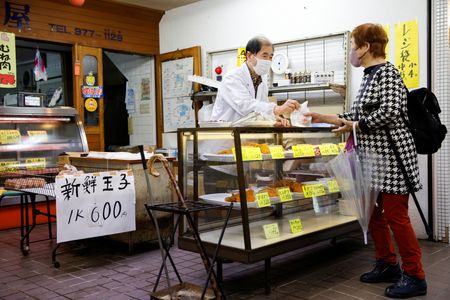 1
1 1
1
By Takahiko Wada and Leika Kihara
TOKYO (Reuters) – Japan’s core consumer prices in May rose 3.2% from a year earlier, data showed on Friday, slowing from the previous month but staying above the central bank’s 2% target for the 14th straight month.
The reading casts doubt on the Bank of Japan’s view that the recent cost-push inflation will prove temporary, and may keep alive expectations it could tweak its massive stimulus programme this year.
The increase in the nationwide core consumer price index (CPI), which excludes fresh food but includes energy items, slightly exceeded a median market forecast for a 3.1% rise. It was slower than a 3.4% gain in April.
An index that strips away the effects of both fresh food and fuel – closely watched by the BOJ as a key barometer of domestic demand-driven price trends – rose 4.3% in May from a year earlier. The rise, which followed a 4.1% gain in April, was the biggest year-on-year increase since June 1981, the data showed.
With inflation having stayed above its target for a year, markets are simmering with speculation the BOJ will soon start to phase out its stimulus, which critics say is distorting markets and hurting financial institutions’ profits.
BOJ Governor Kazuo Ueda has stressed the central bank’s readiness to keep ultra-loose policy until inflation is sustainably around 2% and accompanied by wage hikes.
Ueda has also said core consumer inflation will slow back below 2% toward the middle of this fiscal year, though sustained price rises have put that view into some doubt.
The data heightens the chance the BOJ will revise up its inflation forecasts at its next quarterly review in July.
In its last projections made in April, the central bank expected core consumer inflation to hit 1.8% in the current fiscal year ending in March 2024. That is much lower than a 2.6% increase projected in a Reuters poll taken in May.
(Reporting by Takahiko Wada and Leika Kihara; Editing by Jacqueline Wong)